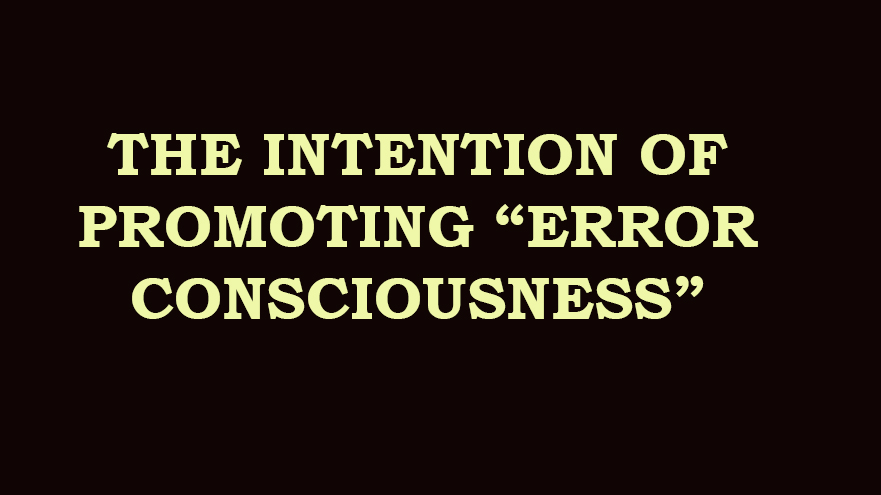
THE INTENTION OF PROMOTING “ERROR CONSCIOUSNESS”
But the critics claim that the Bible is filled with errors. But evangelicals claim that there is not even one demonstrated error in the original text of the Bible. There are no actual errors in the Bible. Because Bible is the word of God and God cannot err. But there are difficulties. That is why we do this now. Answering all the criticisms and questions of the critics would require all the answers given to them though history and contemporary research. The truthfulness of the Bible does not depend on your capacity to answer the questions of the critics.
Even though the accused discrepancy may only pertain to a matter not directly germane to the case, the jury’s confidence in the witness’s general credibility can be shaken. Hence they may reject his testimony relating to other more important matters. It is in this way that anti-supernaturalists and rationalists attack the Bible’s overall trustworthiness by attempting to show that scripture contains various discrepancies and contradictions and demonstrable errors in matters of history and science. (Some do it even without knowing that they are in the evil bandwagon) (Jn 3:10-12)
Just as a single demonstrable sin against Jesus will disprove His sinlessness, a single demonstrable error in the originals of the Scripture will impair God’s promise keeping integrity. But how do the critics know there are errors in the original and that the errors in the present Bible are not copying errors, when the originals are not available now. Hence to question the inerrancy of the original autographs the critics need more amount of blind faith in their own unbelief. And this is highly unreasonable. Their problem is lack of faith in God supplemented by undue faith in the opinions of men and also self -confidence, as against confidence in God. We defend the inerrancy because it is taught by Christ and apostles.
GOD’S PURPOSE IN ALLOWING THE SO-CALLED “ERRORS” IN THE BIBLE
The word Bible denotes the original manuscripts of the written Word of God. In that sense what we have today are only translations of the Bible. No translation needs to be perfect. But the written Word of God in the original manuscripts of the Bible has no error at all (Explain). Moreover there is no conceptual error in the Bible. This means that Bible is perfect in all it intends to teach. ‘Copying errors’, if any, do not hamper the basic message of the Bible. Since everything happens under the sovereign control of God, even the so called ‘copying errors’ in the translations of the Bible are not without a purpose from God. For those who are spiritually wicked, those ‘copying errors’ are a stumbling block to believe in the revelation, inspiration, infallibility and inerrancy of the Bible. Those ‘copying errors’ help to manifest the inherent, internal sin and evil of the unbelieving heart of the unborn-again man when he shies away from the Scripture thinking that it is not the Word of God. All these things work together to convince man that his real problem is the internal problem of sin and that he cannot legitimately blame any external entity or circumstance for this, other than himself. Thus man may realize that what defiles him is that which comes from within.
COMMON MISTAKES OF CRITICS
- Inerrancy does not demand strict adherence to the rules of grammar. (Lower level grammar can be bypassed for higher levels of communication).
- Inerrancy does not exclude figures of speech, literary genre (hell fire and in darkness - no contradiction).
- Inerrancy does not demand historical or semantic precision. Imprecision is not error. (2.5 / about 3).
- Inerrancy does not demand technical language of the modern science (Sun rises or earth revolves). Bible is pre-scientific, not a scientific text book.
- Inerrancy does not demand verbal exactness. Citations from OT in the NT. (Citation vs quotation). Words can change but not the meaning.
- Inerrancy does not guarantee exhaustive comprehensiveness of any account.
- Inerrancy does not demand inerrancy of non-inspired sources used by Biblical writers.
OUR RESPONSE TO CRITICS
The Bible has faced challenges from within and without the church. Even some theologians have falsely conceded that the Bible just contained the word of God, but not in itself the word of God. Bible has withstood the criticisms of the severest skeptics, agnostics and atheists through the centuries. And it will withstand the feeble efforts of the unbelieving critics today and after. Truth is able to stand on its own feet.
When we talk about the doctrine of original inerrancy, we are not talking about a kind of mysticism or blind faith. Ignorance is not given a premium by God. We have to look at the plain evidence He has revealed (Rom 1:18-19). “Walk in wisdom ....that you may know how you ought to answer each one” (Col 4:5-6). “Sanctify Lord God in your hearts....be ready to give answer ... (1Pet 3:15). Love God with all your heart, soul, mind ...(Mt 22:37). Part of this loving duty is also to give answers to those who criticize God’s word. Because answer a fool according to his folly (Prov 26:5).
HAS GOD SAID? ... DEVIL AND DOUBT
Devil’s strategy is to cast doubt on what is revealed by God. Peter – sink – doubt. He promotes confusion in the following way: “Bible may the inspired word of God in some sense; but it is also human words. It had human authors. And to err is human. Hence we should expect some errors in the Bible”. It is a faulty reasoning. Because: Jesus was a human being. Human beings sin. Hence Jesus sinned. But Jesus was without sin (Heb 4:15). The mistake is to assume that Jesus is like any other human. He was the perfect human being. He was not just human, but also God. Similarly Bible is not merely a human book. It is also the Word of God. It is both divine and human at the same time.
Just as Jesus was human, but did not sin, Bible is a human book but does not err. Thus both the living word of God and the written word of God are human but without error.



